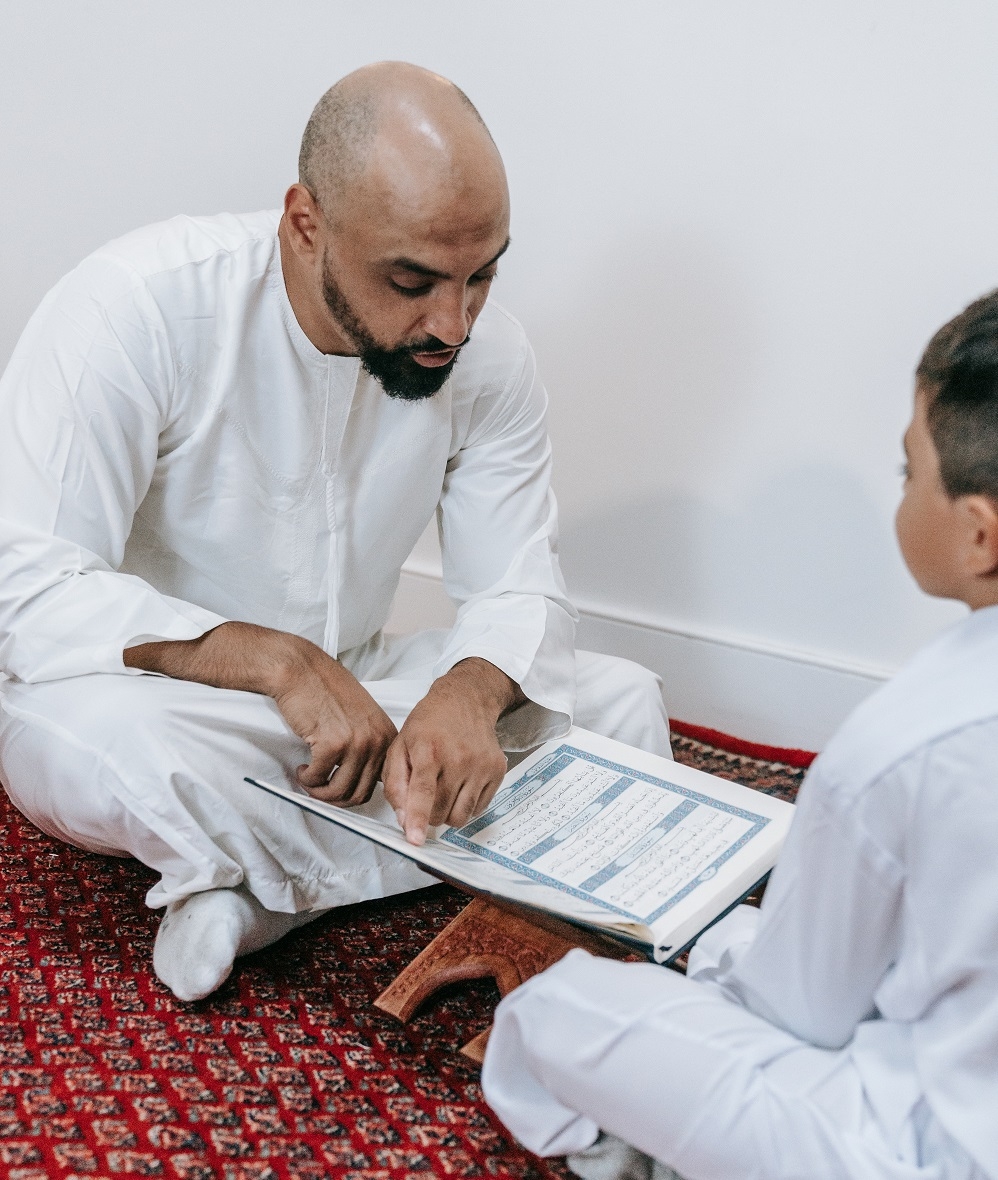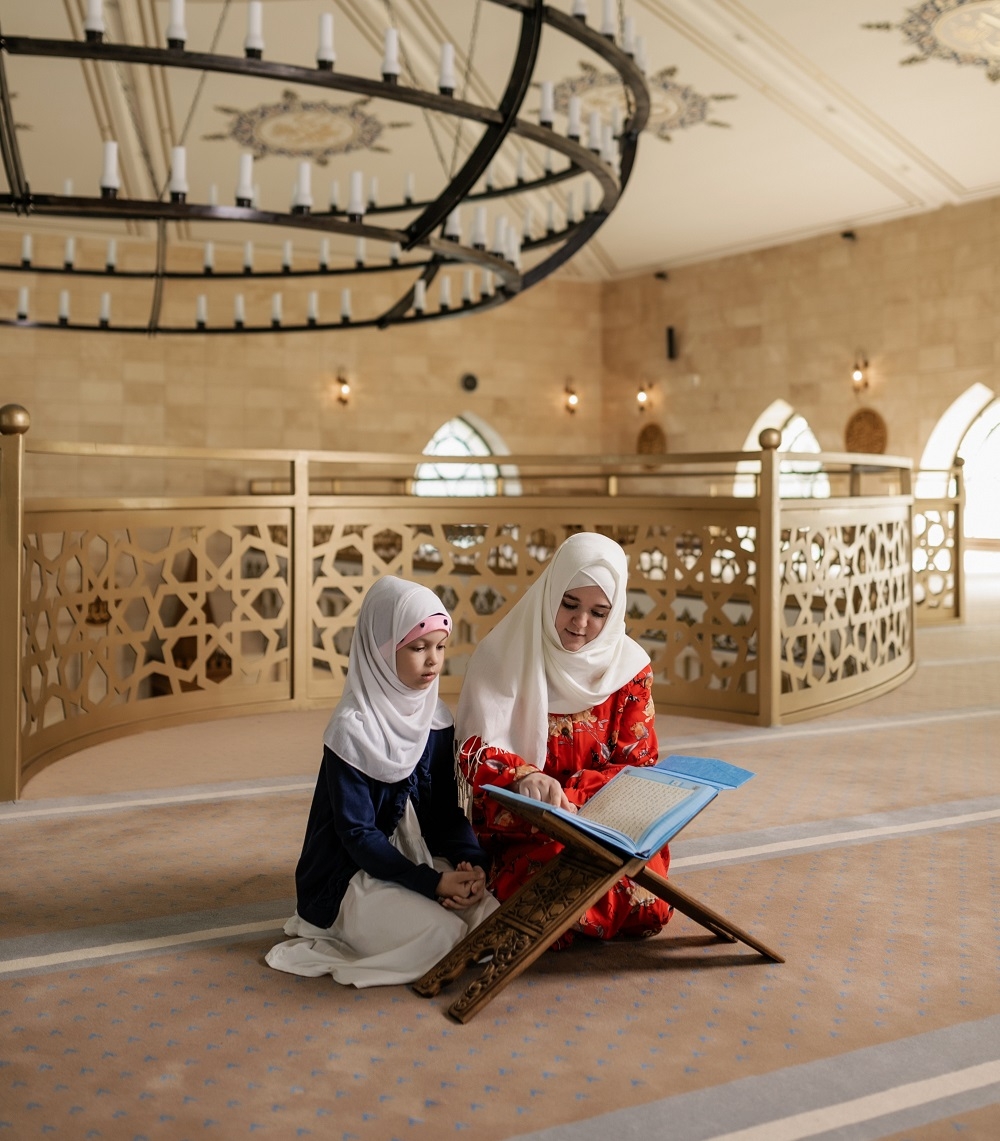3 Important Tips for Incorporating Quran & Islamic Studies During the School Year
Faith
|
Oct 5, 2023
|
6 MIN READ

Image source: Pexels; photo by Alexa Darmel
As parents, it’s our responsibility to provide our children with a well-rounded education that includes not only secular subjects, but also spiritual and moral ones. For Muslim families, this means scheduling time for Islamic studies and Quran alongside regular school activities. Remember, if we don’t model the behavior we want our kids to demonstrate, that’s hypocritical, and kids will call it out quickly!
So, how do you effectively program and plan Quranic and Islamic education for children during the school year? Let’s get into it! And please note, these tips are focused on kids, but they can easily be applied to parents as well.
1. Find the right teacher.
One of the most critical aspects of scheduling Islamic studies and Quran education is finding a qualified and dedicated teacher. Here are some tips on how to find the right teacher for your family:
- Local community resources: Begin your search by reaching out to your local mosque or Islamic center. They often have information about qualified teachers or Quran classes for children and adults.
- Word of mouth: Ask friends and fellow parents in your community if they have any recommendations for Quran or Islamic studies teachers. Personal referrals can be valuable
- Online platforms: Utilize online platforms like social media groups or websites that connect students with qualified Quran and Islamic studies teachers. Be sure to check reviews and credentials.
- Interview potential teachers: Once you have a list of potential teachers, arrange interviews to assess their teaching style, qualifications and compatibility with your family's values and goals. Know your child’s learning style. Do they need an in-person Quran teacher? Can they work well with someone online? (This will open up many possibilities.) It's recommended to do a two-week trial and compensate the teacher for their time, especially if it isn’t a good fit for you child.

Image source: Pexels
To explore this search further and learn about the experiences of other Muslim parents in finding the right teacher, you can listen to this episode of Mommying While Muslim podcast.
2. What to look for in programs.
When considering Quran and Islamic studies programs for your children, be honest: Are you looking for babysitting or real instruction? What credentials make a program an actual good program in Islamic studies and Quran? Talk to the administrators, send emails and use the instant chat boxes to dig deep and find out if this program has a robust curriculum that you want your child/ren to enroll in.
- Curriculum: Look for programs that offer curricula covering everything you are looking for. Are you looking to learn the basics of reading Quran? Do you want the course to cover Quranic recitation and rules of tajweed, tafsir (interpretation), hadith (sayings of the Prophet), Islamic history and ethics and so on? Some charge more for each science, so look out for those fine print guidelines.
- Qualified instructors: Ensure that the program is taught by knowledgeable and certified instructors who can engage students and answer their questions effectively. This is crucial, because often our native born Muslim kids can’t understand accents or overseas jokes/cultural expectations of behavior. No, they’re not little racists for not vibing with teachers who have a different frame of reference, but they need to feel camaraderie with an authority figure to make them more at ease hence, more open to instruction.
- Cultural competency between instructor and student: That common thread can’t just be that both teacher and student are Muslim. Look for cultural competency when choosing a teacher. Also, will there be just one teacher or multiple? Because kids need structure. Constantly switching faces are not going to build their confidence in themselves or in their instructors.
- Age-appropriate material: Programs should be tailored to the age and comprehension level of your child. Consider if the instruction will be 1:1 or in a group setting. For younger children, consider programs with interactive and engaging content.

Image source: Pexels
- What's the pacing like? Fnd out if self-paced learning is permitted to cater to kids of all abilities. Just because your kid is five doesn’t mean he’s okay hanging out where other five-year-olds do; if he shows aptitude, will he be encouraged to move forward at his own pace or have to hang back with classmates who aren’t there yet? The same goes for a kiddo who isn’t keeping up with classmates. Is she going to be affected in terms of self esteem, ridiculed or held high for trying her best?
- Flexibility: Choose a program that accommodates your family's schedule, whether it's weekend classes, after-school sessions or online learning options. Are makeup available? Is there a penalty for skipping classes? Will you be able to access resources no matter where you are in the world? Is the instructor comfortable conversing with mom and dad? (You’d be surprised; some instructors insist upon conversing with either the mother or father depending on if they’re a male or female instructor, so ask about this.)
- Feedback and assessment: Programs that provide regular feedback on your child's progress are new, but beneficial. Assessments can help track development and address any weaknesses. Make sure your teacher or program is able to quantify learning, if that’s important to you. But don’t think it’s okay to check out after your kid logs on and off and not follow up on what they’re learning. Be engaged with the kids so you can keep up with them!
3. Making time.
Balancing Quranic and Islamic education with the demands of the school year can be challenging. But with effective time management, it's possible. We all know that there is enough time in the day for things that matter to us. If we aren’t making time for Quran and Islamic studies, there may be something the matter with our schedule!

Image source: HH fashion writer Hakeemah Cummings.
Here are some strategies to help you make time in your schedule for spiritual study:
- Prioritize: Identify the most convenient time slots during the week when your family can dedicate time to Quranic studies and Islamic education. This might include weekends or evenings. Don’t rule out early morning, but this is tough with elementary-aged kids. And don’t be afraid to say no to social engagements that come up at the same time as class. Offer to go earlier to the event, later or not at all in lieu of what you’ve prioritized, which is hopefully consistent Islamic studies and Quran.
- Create a schedule: Develop a weekly schedule that allocates specific time blocks for Quranic recitation, memorization and Islamic studies. Stick to this schedule as consistently as possible. Getting kids involved with colored Post-its really helps with this, especially if you have a larger family, and it’s tough to keep track of activities.
- Combine activities: Integrate Quranic studies into daily routines. For example, you can listen to Quranic recitation during car rides or while doing household chores. Voila! Homework done!
- Family involvement: Encourage family involvement by setting aside time for Quranic studies as a family activity. This not only strengthens bonds but also promotes learning. Again, monkey see, monkey do. and if we want our little primates to read the Quran, they’ve got to see us doing it.
To hear more about practical tips for scheduling Quranic studies into your busy family life, check out this episode of Mommying While Muslim podcast.
The school year is well under way, but that doesn’t mean it’s time to check out of Islamic studies and Quran! Find the right teacher, select suitable programs, and make time in your family’s schedule to take crucial steps in this journey. Remember, the effort invested in this endeavor has a lasting impact on all our lives.
For further guidance and personal stories on this topic, explore the Mommying While Muslim podcast, where you'll find relevant episodes that delve deeper into these aspects of Muslim parenting.
By implementing these strategies and seeking support from the Mommying While Muslim community, you can successfully incorporate Islamic and Quran education into your family's busy school year routine, fostering a deeper connection between kids and Islam.
Dr. Uzma Jafri is originally from Texas, mom to four self-directed learners, a volunteer in multiple organizations from dawah resources to refugee social support services, and runs her own private practice. She is an aspiring writer and co host of Mommying While Muslim podcast, tipping the scales towards that ever elusive balance as the podcast tackles issues second generation Americans have the voice and stomach to tackle.
Subscribe to be the first to know about new product releases, styling ideas and more.
What products are you interested in?



